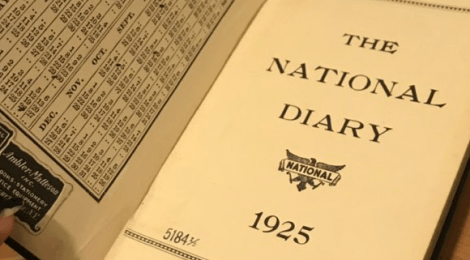
The Difficulties of Historical Practice
During my time as an intern at Locust Grove, I have been transcribing Annette Young’s diary entries in order to obtain relevant information about the family’s history and collections. So far, I have transcribed her diaries from 1910 and 1925, and I have recently started on another diary from 1907. Although I have enjoyed learning about Annette and the Young family, I have definitely encountered quite a few problems while attempting to transfer the information into the digital archive. Here are some of the few frustrating aspects of this project (and thus are the struggles of a historian):
- Illegible handwriting.
When I first began my work at Locust Grove, I was afraid that I would never be able to make sense of Annette’s handwriting. She wrote exclusively in script, and most of the time her S’s look like T’s and her I’s look like L’s. Sometimes the lowercase letters just look like scribbles on the page, and trying to make out the correct word is frustrating for Ken (the estate’s Executive Coordinator and my internship supervisor) and I both. What has helped me transcribe these diaries more efficiently has been finding patterns in her handwriting, and comparing the letters to other words that I was able to make out. For example, it took me a while to recognize the last name “Dobson,” was, in fact, “Dobson” and not “Wobson.” I inevitably made that connection after she wrote his name again, except with “Dr.” framing the name; it’s a lot easier to make out some of the words when given more context. I don’t know how someone can make a D look like a W- Annette was truly gifted in that way.
- Inconsistencies in the collection.
Upon searching through the archives for another diary for me to transcribe, Ken and I discovered that there were two diaries dated to 1925. When we flipped through each diary, we noticed that one of the diaries was, as far as we could tell, completely full, while the other only had scattered entries. We then compared the first dated entry to each other, and realized that the text was similar, but they were not completely the same, noting a few inconsistencies in the information. Neither Ken nor I knew why there were two different diaries and why the entries were slightly different. I started transcribing the 1925 diary that was more complete, and I noticed that there were no entries from May 24th until June 5th, but the rest of the dated entries were filled. I think that perhaps the diary was lost during that week of time, so Annette got a new diary as a replacement and attempted to reenter her old entries, but eventually found the original diary. This, of course, is only my personal speculation. Sometimes while working on historical projects, obscure inconsistencies like this one will appear without reason, and all you can really do is infer as to why and accept the unusual occurrence.
- Vague statements.
Another one of the challenges I experience while working at Locust Grove is Annette’s vague references to potentially important collection pieces. She’ll often reference pieces of furniture, jewelry, etc., but her descriptions are very unspecific so we are unable to determine if the piece is still in the Locust Grove collection. Sometimes though, we’ll get lucky and Annette will talk about the specifics. Most of the collection pieces we are able to identify in her entries are paintings and photographs because the paintings are all still hanging in the mansion, and most of the photographs have been sorted through and put into the digital archive.
- Language in a historical context.
Language has undoubtedly evolved since the early 20th century. Sometimes Annette will use words or phrases that are completely unusual to me, and I’ll have to google what exactly she’s referencing. Most of the time she uses old-fashioned words for sicknesses and diseases, which now are better understood and defined. In the 1907 diary, it seems that every other day another person is sick with grippe, which I learned is just an old word for the common flu. She also talks a lot about the flowers and vegetables in the estate’s garden, such as the scyllas, which I eventually realized were an old-fashioned way to spell the name of the Scilla flower.
I often find some really interesting pieces of information while transcribing these diaries despite all of the problems that I also encounter. I feel that my internship has prepared me for the typical experiences of a local historian; which is, in summary, a lot of frustration, but an even greater sense of fulfillment.